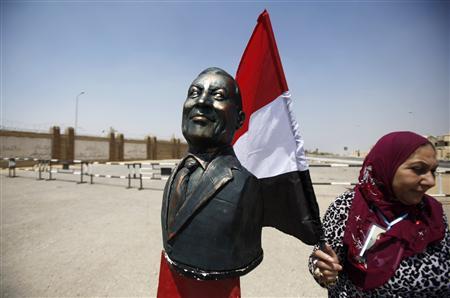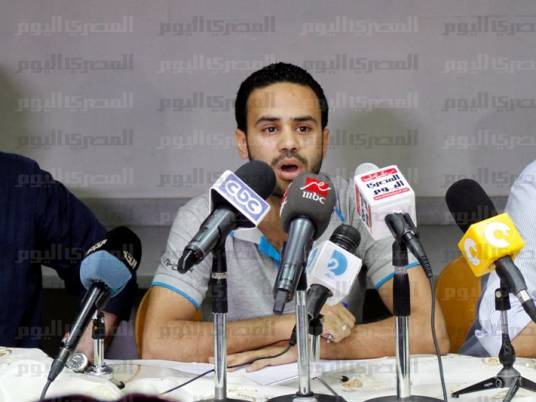Tuesday’s papers focus on two issues: efforts to expose the corruption of former President Honsi Mubarak’s regime, and the controversy surrounding the upcoming referendum slated for 19 March. The state-owned Al-Ahram daily, which previously served as the regime’s mouthpiece, continues its anti-corruption campaign that began after Mubarak’s fall. The paper leads with the headline: “Government measures to uproot corruption.” It highlights allegations of land misappropriations by former politicians and stalwarts of Mubarak’s National Democratic Party (NDP).
The paper says that former Agriculture Minister Amin Abaza misappropriated 260 feddans to prominent businessman and NDP leader Mohamed Abul Enein along Cairo-Ismailia road. Abaza sold the land for LE5.5 million while the real value reached as high as LE11 billion. Moreover, Abaza sold 11,556 feddans to businessman Amr Mansi in Sinai despite a law that prohibits land sales in the peninsula. For his part, Mansi then illegally sold the same piece of land to non-Egyptians, says Al-Ahram. Under Egyptian law, foreigners are not allowed to acquire land in the Sinai peninsula for security reasons, because it is situated near Egypt’s border with Israel.
Along the same lines, state-owned daily Al-Gomhorriya leads with the headline: “Looted land returns to the people.” The headline attests to the editorial board’s change of heart since Mubarak’s resignation. After decades of defending Mubarak’s regime and rebuffing all accusations of state-sponsored corruption, Al-Gomhorriya has begun running its own anti-Mubarak campaign in recent weeks. The paradox is manifested in another headline that reads: “The first referendum to be held without any vote rigging.” The paper, which had long denied allegations of voting fraud, now admits that all previous elections conducted under Mubarak were fraudulent. The paper says that 18,000 judges will monitor the poll on Saturday.
The state-owned Al-Akhbar leads with a call from the Supreme Council of the Armed Forces for voters to participate in the referendum and cast whatever ballot they wish. The paper dedicates a full page to a statement the council posted on its official Facebook page.
Meanwhile, Al-Akhbar highlights mixed reactions to the proposed changes by reviewing reactions posted by Facebook users on the same page. While some of the respondents support the constitutional modifications because they believe they will help ensure political stability, others insist that a new constitution should be drafted immediately.
The same divide has polarized legal and political circles recently. Proponents of the military-backed amendments believe a “yes” vote will expedite the transition period and send the military back to its barracks sooner. Yet, those opposed to the amendments contend that hasty elections will ultimately cause Egypt to end up with a parliament dominated by Islamists and remnants of Mubarak’s party. They argue that the interim period should be extended until emerging groups can become more organized and build a strong base of support.
Concerning the same issue, the privately-owned Al-Shorouk runs poignant opinion pieces written by two prominent columnists. Wael Qandil, the paper’s managing editor, warns of “sedition” over the amendments. “[This sedition] is the most dangerous ordeal facing the Egyptian revolution,” writes Qandil. “Accepting an old Constitution patched with these amendments violates the ideals of the revolution, which has destroyed an old and obsolete system…” By the same token, prominent political scientist Amr Hamzawy writes about attempts by some media outlets to convince Egyptians that voting “no” would exacerbate instability. Hamzawy dismisses such warnings as “an undemocratic attempt that aims at scaring citizens and pressuring them to vote with a ‘yes.’”
“Egypt will not sink into chaos if we vote against the amendments. Then, we would be looking for another constitutional formula that can ensure a democratic transition,” he writes.
Egypt's papers:
Al-Ahram: Daily, state-run, largest distribution in Egypt
Al-Akhbar: Daily, state-run, second to Al-Ahram in institutional size
Al-Gomhorriya: Daily, state-run
Rose al-Youssef: Daily, state-run, close to the National Democratic Party's Policies Secretariat
Al-Dostour: Daily, privately owned
Al-Shorouk: Daily, privately owned
Al-Wafd: Daily, published by the liberal Wafd Party
Al-Arabi: Weekly, published by the Arab Nasserist party
Youm7: Weekly, privately owned
Sawt al-Umma: Weekly, privately owned




